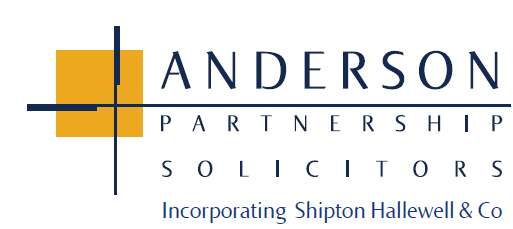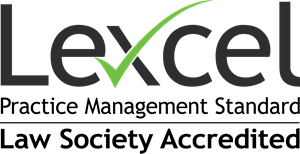
Anderson Partnership welcomes Shipton Hallewell & Co to 71 Saltergate, Chesterfield
In such uncertain times, Anderson Partnership Solicitors has remained resolute in continuing to provide advice and assistance to those that need it. Demonstrating that it remains forward-thinking and with a business model to match, we are pleased to announce that Anderson Partnership is to become the successor practice to Shipton Hallewell & Co from 1 March 2022.
Shipton Hallewell & Co are believed to be the Chesterfield area's oldest law firm, having being established in 1756. Over 255 years of working with clients is reassurement that quality advice and assistance has prevailed.
Both existing and new clients can now benefit from additional expertise that the bringing together of our two firms provides for, all of which will be consolidated at 71 Saltergate Chesterfield.
To enable a seamless integration, telephone and email enquiries to Shipton Hallewell & Co will be re-routed to Anderson Partnership and the same teams will be dealing deal with matters prior to those of 1 March 2022.
Here's to the next 255 years!


Anderson Partnership welcomes Peter Kidd as Head of Civil Litigation and Dispute Resolution
Anderson Partnership Solicitors are pleased to announce the arrival of Peter
Kidd as their new Head of Civil Litigation and Dispute Resolution. Peter is a
Solicitor with a decade’s worth of experience in Dispute Resolution work and
brings with him experience of running cases in the High Court, Technology and
Construction Court and the County Court.
He is also highly experienced in negotiating out of Court settlements for clients through mediation and negotiation and boasts a formidable win record in and out of Court.
A lifelong resident of the area, Peter has many professional connections locally and is delighted to be back working in his hometown to help the needs of the local community and clients further afield.
He understands that people who are involved in a dispute are often very stressed so it’s important for them to feel reassured by their solicitor, have things explained to them clearly and be made fully aware of the best and most cost-effective way of settling a dispute. While he would prefer for disputes not to develop and help clients settle cases out of Court where possible, in the event that a Court hearing is required he will represent your interests robustly.
The areas of law Peter can assist you with include:
· Challenging a Will.
· Disputes over the administration of an estate.
· Building Disputes, including Construction and Engineering Disputes.
· Business Disputes, including shareholder disputes, directors’ disputes and partnership disputes.
· Civil or Commercial Landlord and Tenant Matters.
· Professional Negligence.
· Property Disputes including Property Ownership Disputes, Boundary Disputes and Party Wall Act Matters.
· Settlement Agreements.
· Debt Recovery.
Whether your case is large or small Peter can help. So why not contact him today on 01246 220737 or e-mail him at peter@andersonslaw.co.uk

The Coronavirus COVID-19 pandemic has far-reaching consequences for both employers and employees.
Senior Litigator and Employment Lawyer, Marc Turner discusses a few of the issues here.
Email marc@andersonslaw.co.uk to discuss these and any other issues regarding COVID-19 and employment issues.
Employers’
obligations?
Employers have a legal duty of care to ensure, as far as is reasonably practicable, the health and safety of their employees and anyone else affected by the business (e.g. contractors, workers and the public). Risk assessments should be undertaken, with special consideration to individuals who may be more vulnerable e.g. those with a disability, young people, the elderly, or pregnant women. The extent of the measures taken by each organisation may be dictated by the economic resources available to tackle the present day to day issues arising from the pandemic.
Action to be taken by Employers
Staff should work from home where possible. If your business is one that has been directed to close by the government then it should do so (e.g. restaurants, pubs, leisure centres). Encourage employees to be extra-vigilant with hand washing and using/disposing of tissues etc. Distancing in the office should be maintained and rotas may be introduced to restrict the numbers of staff in the office at one time.
Risks to be considered for staff members:
- Can staff work from home in order to follow the latest guidance on social distancing? Allow staff to do so if possible, particularly those in vulnerable groups
- Monitor advice and guidance from WHO, NHS, government and ACAS
- Consider policies regarding staff returning from affected areas and whether they should self-isolate or not.
- Consider particularly vulnerable staff e.g. pregnant, impaired immunity, those on secondments. In particular, consider whether any adjustments can be made to working day for these people so that they do not have to use public transport at peak times
- Individuals should report to HR if they have travelled abroad and they should be advised to self-isolate if they are at risk
- Remember that any health information is a “special category” of personal data and that individuals should not be singled out to ask to report or for checks because of their ethnicity or nationality
- Identify key roles in the business that would be necessary for continuity purposes
- Review insurance policies
- Apply policies fairly and reasonably e.g. flexible working and sickness absence.
- Cancel all meetings face to face where possible and undertake telephone conferences or via social media platforms
Non-attendance by an employee and entitlement to pay?
If an individual does not attend because they are sick with COVID-19 they will be entitled to sick pay in the usual way (either contractual or statutory where applicable).If they cannot attend work because of other obligations/responsibilities, e.g. the school is closed, this should be dealt with in accordance with the usual firm’s policy for time off for dependents in the first instance. Annual leave may be taken for longer periods, and there is the right for parental leave if it is longer (unpaid). Parents struggling with childcare issues can also be furloughed.
If the individual is self-isolating on the basis of medical advice from their GP, Public Health England and/or NHS 111, and because of that isolation is unable to work, then the government has confirmed that the employee will be entitled to statutory sick pay (SSP). This is a temporary measure and will expire on 12 November 2020.
The government has confirmed in the Budget that SSP would be payable from the first day of absence (instead of day 4) and that it would reimburse employers with no more than 250 employees up to 14 days SSP. SSP is currently £95.85 from 1 April 2020. These Regulations have not yet been published and the government has yet to confirm how and when these refunds will be administered. If the individual is shielding then they can be furloughed.
If you pay your staff SSP, there is a risk that an individual who has been told to self-isolate will still go to work to avoid the decrease in pay. It is therefore at your discretion as to whether you pay them above and beyond SSP, for example, full or half salary.
In order to decide on the best course of action, you will need to act in accordance with your Staff Handbook and/or Sickness and Annual Leave policies. If you wish to amend your policies, you should notify your staff in advance. You may not unilaterally change the terms of employment of an employee and care should be taken to obtain the agreement of any employee if you are to alter their contract, even if only upon a temporary basis.
If your policy is not to pay people but individuals come into work anyway, then to compel them to isolate would likely require full pay, because there is an implied right to wages if the individuals are able to work (despite being sent home by their employer). Having a policy that sets out clearly that holiday will be required to be taken, for example, could avoid these issues.
If the individual is not at work but it has been agreed they can utilise flexible working policies to work from home whilst self-isolating or caring for their children, for example, they should be paid as normal.
Employees wish to Return to Work
Employees may express a genuine concern about catching coronavirus and consequently be unwilling to attend work. If this is the case you should listen carefully to the concerns of your employees and, if possible, offer flexible working arrangements. Staff should be allowed to work from home where possible.
Employees can also request time off as holiday or unpaid leave but there is no obligation on employers to agree to this. If an employee refuses to go to work without due cause, you are entitled to take disciplinary action.
Reduced staff requirements due to COVID-19
The needs of the business should be considered on a case by case basis. It is possible to direct staff to take their annual leave at a designated point which may cover some of the problems, although care must be taken to provide the correct notices as required under the Working Time Regulations 1998.
Staff may have short-time working or lay-off provisions in their contracts that can be utilised, although be mindful of the ability of staff to request redundancy payments after a prolonged period of lay off.
You may also wish to make use of the Government’s Coronavirus Job Retention Scheme (“furlough scheme”) and you can find more information about that scheme from the government website. Furloughing staff involves a temporary variation to contract and you should seek advice on this.
Temporary variations to contract might be possible to agree with the workforce, and, in extreme cases, redundancies may be required. If the company envisages making 20 or more people redundant in a 90day period, the collective procedure will come into force.
Other resources:
- The government publishes daily updates with the latest COVID-19 updates and advice.
- Acas : Guidance for employers and employees from Acas, the Advisory, Conciliation and Arbitration Service, an independent body funded by the Government.
- NHS : Health-related guidance from the National Health Service.
- Public Health England including, eg, specific guidance for employers, educational and health-related organisations, and an option to receive updates directly.






